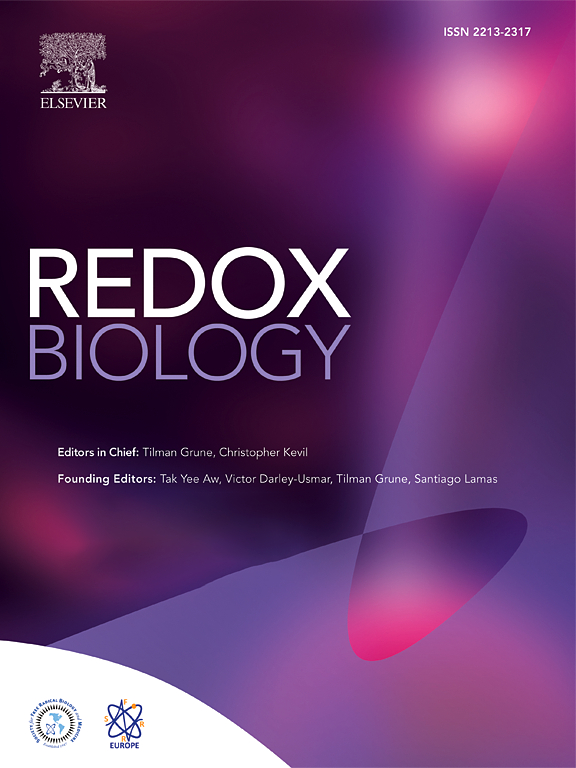Deletion of CD38 mitigates the severity of NEC in experimental settings by modulating macrophage-mediated inflammation
IF 10.7
1区 生物学
Q1 BIOCHEMISTRY & MOLECULAR BIOLOGY
引用次数: 0
Abstract
Necrotizing enterocolitis (NEC) is a form of potentially lethal gastrointestinal inflammation that primarily affects preterm neonates. It is crucial to recognize that, while the disease carries significant risks, timely and effective medical intervention can greatly enhance the chances of survival. Additionally, NEC is closely linked to the activation of macrophages, highlighting the complex interplay between the immune response and disease progression. CD38, acting as an ectoenzyme, catalyzes the hydrolysis of NAD+ to produce cyclic ADP-ribose (cADPR), a reaction critical for modulating cellular redox balance and energy homeostasis. This enzymatic activity is particularly pertinent in the context of necrotizing enterocolitis (NEC). In this research, we investigated whether CD38 deletion can elevate NAD+ levels to reduce macrophage-mediated inflammation and improve NEC severity. We show that NEC patients was associated with the increased CD38 expression in intestine and blood. These results were also observed in NEC mice, and CD38 deletion ameliorated NEC intestinal injury. Mechanistically, CD38 deletion elevated NAD+ levels that reduced oxidative stress and intestinal inflammation. Furthermore, CD38 deletion promoted M2 macrophage polarization, inhibited macrophage activation and phagocytosis ability. Thus, our results reveal a critical role for CD38 as an intracellular immune regulator for regulating macrophage activation and intestinal inflammation in NEC. Targeting CD38 and NAD+ signal maybe a promising strategy for treatment of NEC.
通过调节巨噬细胞介导的炎症,缺失 CD38 可减轻实验性 NEC 的严重程度。
坏死性小肠结肠炎(NEC)是一种可能致命的胃肠道炎症,主要影响早产新生儿。我们必须认识到,虽然这种疾病有很大的风险,但及时有效的医疗干预可以大大提高存活几率。此外,NEC 与巨噬细胞的活化密切相关,凸显了免疫反应与疾病进展之间复杂的相互作用。CD38 作为一种外切酶,催化 NAD+ 的水解,生成环状 ADP-核糖(cADPR),这一反应对调节细胞氧化还原平衡和能量平衡至关重要。这种酶活性与坏死性小肠结肠炎(NEC)尤其相关。在这项研究中,我们探讨了 CD38 缺失是否能提高 NAD+ 水平,从而减少巨噬细胞介导的炎症并改善 NEC 的严重程度。我们发现,NEC 患者与肠道和血液中 CD38 表达的增加有关。在 NEC 小鼠中也观察到了这些结果,CD38 基因缺失可改善 NEC 肠道损伤。从机理上讲,CD38 基因缺失可提高 NAD+ 的水平,从而减少氧化应激和肠道炎症。此外,CD38 基因缺失还能促进 M2 巨噬细胞极化,抑制巨噬细胞活化和吞噬能力。因此,我们的研究结果揭示了 CD38 作为细胞内免疫调节剂在 NEC 中调节巨噬细胞活化和肠道炎症的关键作用。靶向 CD38 和 NAD+ 信号可能是治疗 NEC 的一种有前景的策略。
本文章由计算机程序翻译,如有差异,请以英文原文为准。
求助全文
约1分钟内获得全文
求助全文
来源期刊

Redox Biology
BIOCHEMISTRY & MOLECULAR BIOLOGY-
CiteScore
19.90
自引率
3.50%
发文量
318
审稿时长
25 days
期刊介绍:
Redox Biology is the official journal of the Society for Redox Biology and Medicine and the Society for Free Radical Research-Europe. It is also affiliated with the International Society for Free Radical Research (SFRRI). This journal serves as a platform for publishing pioneering research, innovative methods, and comprehensive review articles in the field of redox biology, encompassing both health and disease.
Redox Biology welcomes various forms of contributions, including research articles (short or full communications), methods, mini-reviews, and commentaries. Through its diverse range of published content, Redox Biology aims to foster advancements and insights in the understanding of redox biology and its implications.
 求助内容:
求助内容: 应助结果提醒方式:
应助结果提醒方式:


